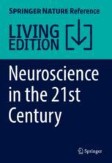Search
Search Results
-
Impulsivity and Compulsivity in Bayesian Reinforcement Learning Models of Addiction: A Computational Critique of the Habit Theory
Addiction is sometimes argued to represent an extreme dominance of habitual behaviour, driven by stimulus–response associations, over goal-directed...
-
Interaction Between Habitual and Goal-Directed Processes in Addiction
Are individuals suffering from addiction in control of their drug use behavior, and is this control habitual or goal-directed? The habit theory of...
-
The Genetically Informed Neurobiology of Addiction (GINA) model
Addictions are heritable and unfold dynamically across the lifespan. One prominent neurobiological theory proposes that substance-induced changes in...

-
Heterogeneity in choice models of addiction: the role of context
RationaleTheories of addiction guide scientific progress, funding priorities, and policy development and ultimately shape how people experiencing or...

-
Internet Addiction
As Internet addiction is becoming more prevalent around the world, it has attracted considerable scientific and public attention. The present chapter...
-
Internet Addiction
As Internet addiction is becoming more prevalent around the world, it has attracted considerable scientific and public attention. The present chapter...
-
Psyche and Mental Illness: Addiction
In this chapter we deal with the topic of addiction: first with the question of the occurrence of addiction, the diagnostic classification and the...
-
Goal-Directed and Habitual Control in Human Drug Addiction
Learning theory has proposed that everyday actions are controlled by at least two dissociable systems: one that governs deliberate goal-directed...
-
Assessment of rTMS treatment effects for methamphetamine addiction based on EEG functional connectivity
Methamphetamine (MA) addiction leads to impairment of neural communication functions in the brain, and functional connectivity (FC) may be a valid...

-
Brain lesions disrupting addiction map to a common human brain circuit
Drug addiction is a public health crisis for which new treatments are urgently needed. In rare cases, regional brain damage can lead to addiction...

-
The neural addiction of cancer
The recently uncovered key role of the peripheral and central nervous systems in controlling tumorigenesis and metastasis has opened a new area of...

-
Alcohol: Neurobiology of Alcohol Addiction
Consumption of alcohol is the third leading cause of preventable deaths worldwide making it a major public health issue. After a brief account of the...
-
Is addiction a brain disease? A plea for agnosticism and heterogeneity
RationaleAlthough increasingly subject to criticism, the brain disease model of addiction (BDMA) remains dominant within addiction science. Yet few...

-
Examining the Association between Cell Phone Use Addiction and Sleep Quality: A Cross-Sectional Study of Medical Sciences Students
PurposeA growing body of evidence has indicated an association between cell phone use and psycho-pathological behavior. However, there is little...
-
Nicotine Pharmacology, Abuse, and Addiction
Despite increased public awareness of the substantial health risks, tobacco use remains one of the greatest public health concerns around the world....
-
Dopamine, behavior, and addiction
Addictive drugs are habit-forming. Addiction is a learned behavior; repeated exposure to addictive drugs can stamp in learning. Dopamine-depleted or...
-
Opioid withdrawal: role in addiction and neural mechanisms
Withdrawal from opioids involves a negative affective state that promotes maintenance of drug-seeking behavior and relapse. As such, understanding...
-
Shared gray matter alterations in subtypes of addiction: a voxel-wise meta-analysis
BackgroundNumerous studies based on voxel-based morphometry (VBM) have revealed gray matter (GM) alterations in multiple brain regions for addiction....

-
Functional Impairments in the Large-Scale Resting Networks of the Brain in Opioid Addiction
Objectives. To assess the functional state of large-scale resting brain networks in patients with opioid intoxication. Materials and methods. A total...
-
Sign- and goal-tracking score does not correlate with addiction-like behavior following prolonged cocaine self-administration
RationaleIn classical conditioning, sign-tracking reflects behavior directed toward a conditioned stimulus (CS) in expectation of a reward...

